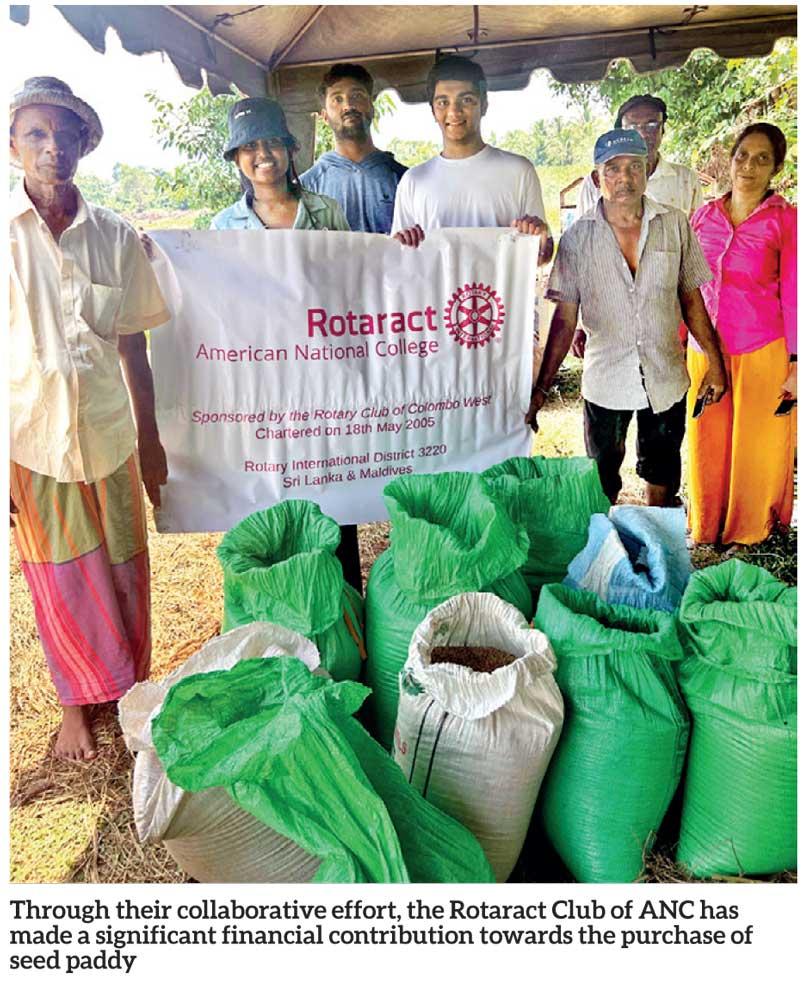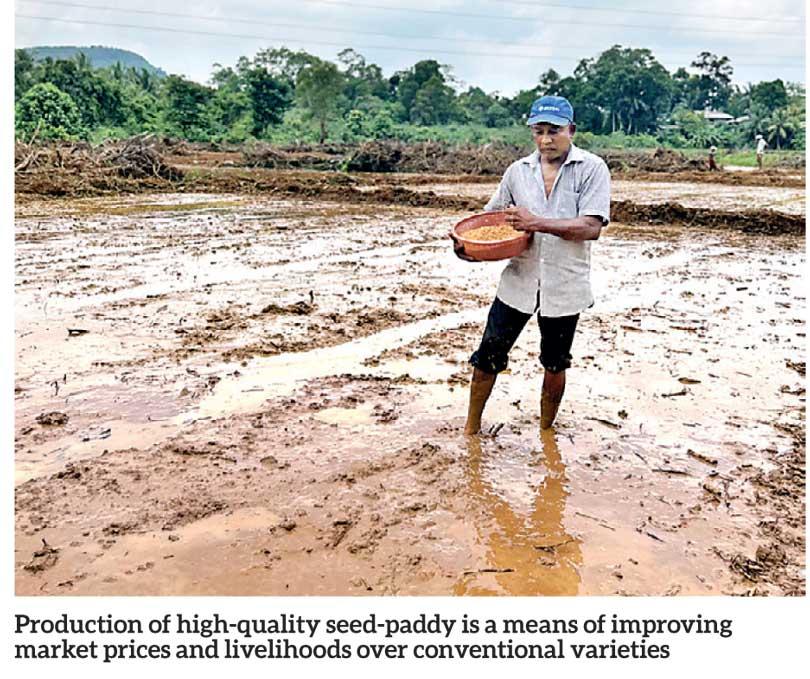15 Jun 2024 - {{hitsCtrl.values.hits}}


During the Covid-19 pandemic, people living in suburban areas had to pay significantly higher prices for food items due to their dependence on long food chains that were disrupted during the pandemic. Efforts like these that promote local food production shorten food miles and lead to local
self-sufficiency
Colombo—In a ground-breaking initiative ‘Ran Goyama’- aligning with the Sustainable Development Goals (SDG) and the Rotaract Club of the American National College (ANC) and partnering with the Hector Kobbakaduwa Agrarian Research and Training Institute- aims to boost domestic agriculture, foster economic growth and promote sustainability.
This commendable project, primarily focusing on SDG 8 — Decent Work and Economic Growth- has paved the way for significant advancements in local farming and community development.
SDG 8 is set to promote sustained, inclusive and sustainable economic growth, full and productive employment and decent work for all. HARTI, in line with this fundamental, has implemented a project titled ‘Participatory Conservation and Productivity Improvement of Paddy-based Ecosystem in Low Country Wet zone’. Through this project, HARTI has engaged with local farming communities to ensure decent and voluntary participation of local people in paddy farming; thereby improving the economic status of their households while contributing to the preservation of a long-neglected ecosystem.
This unique project has been implemented to re-cultivate the abandoned paddy fields in ‘Jayaweeragoda yaya’ of Seethawaka Divisional Secretariat Division. Through their collaborative effort, the Rotaract Club of ANC has made a significant financial contribution towards the purchase of seed paddy to make this project a success. This strategic investment will not only improve food security in Sri Lanka but will also support the local economy while creating many agricultural jobs for local people.
The success of the initiative is palatable. Farmers are enjoying the beauty of the Rath Al plants swaying in the wind. With time they aim to establish a seed-paddy production centre to cater to the needs of the people in the surrounding areas. Seed-paddy production is a relatively higher income business than normal paddy production and traditional rice varieties add even higher value to seed-paddy.
Thus, production of high-quality seed-paddy is a means of improving market prices and livelihoods over conventional varieties. An additional benefit of the project is to develop the entrepreneurial capacity of the local people. Attracting youth to agriculture, which is a missing sector in the current context, is of utmost importance to utilize available resources to achieve economic productivity through this labour-intensive sector.
Abandonment of paddy land for technical and non-technical reasons has led to serious socio-economic and environmental problems, especially in the low country wet zone. From the ecological point of view, preserving this ecosystem, which had been abandoned for almost half a century, is of special importance. During the Covid-19 pandemic, people living in suburban areas had to pay significantly higher prices for food items due to their dependence on long food chains that were disrupted during the pandemic. Efforts like these that promote local food production shorten food miles and lead to local self-sufficiency.
Abandoned paddies are often misused for waste disposal, leading to poor drainage, dengue transmission and other problems. Frequent floods and overflowing canals have made life difficult. Data shows that in Colombo district alone, 181 Grama Niladhari Divisions (GNDs) subject to floods and canals are overflowing in 146 GNDs. Paddy lands, classified as shallow wetlands according to the Ramsar Convention on Wetlands of International Importance, have the capacity to hold excess rainwater, but the problems have directly and indirectly been caused by the abandonment of those paddies.
In this background, contributing to the sowing of paddy fields that had been abandoned for a long time, this initiative has aimed not only at food production but also at long-term sustainability. The use of locally sourced seed paddy ‘Rath El’ also ensures that the agricultural output is adapted to the local climate and soil conditions, reducing the need for chemical interventions and promoting a greener approach to farming. The project has indeed acted as a catalyst for community cohesion and environmental respect, providing a stellar example of how economic activities can be aligned with environmental conservation.
The Hector Kobbekaduwa Agrarian Research and Training Institute provided guidance and coordination through the project titled ‘Participatory conservation and productivity improvement of paddy-based ecosystem in low country wet zone’ to ensure that agricultural practices followed by farmers are sustainable and environmentally friendly.
Directly involved in the farming process, this project helped the community to obtain Rath El, a traditional type of rice based on the wisdom of the local people. Moreover, the initiative has fostered a spirit of cooperation among local people to share resources to achieve a socio-cultural goal of preserving the neglected and increasingly disappearing cultural norms associated with rice farming.
As this project continues to unfold, the positive ripple effects on the community are expected to expand further, embodying the true spirit of the Sustainable Development Goals. The Rotaract Club of ANC and the Hector Kobbakaduwa Agrarian Research and Training Institute are commended for their foresight and commitment to sustainable development, proving that strategic partnerships and thoughtful investments can profoundly impact social and economic growth.
A heartfelt thanks is extended to the Rotaract Club of ANC for their visionary approach and unwavering support of sustainable development. Their dedication not only enhances immediate agricultural productivity and economic stability, but also secures a prosperous and sustainable future for all Sri Lankans.
28 Dec 2024 1 hours ago
28 Dec 2024 1 hours ago
28 Dec 2024 2 hours ago
28 Dec 2024 3 hours ago